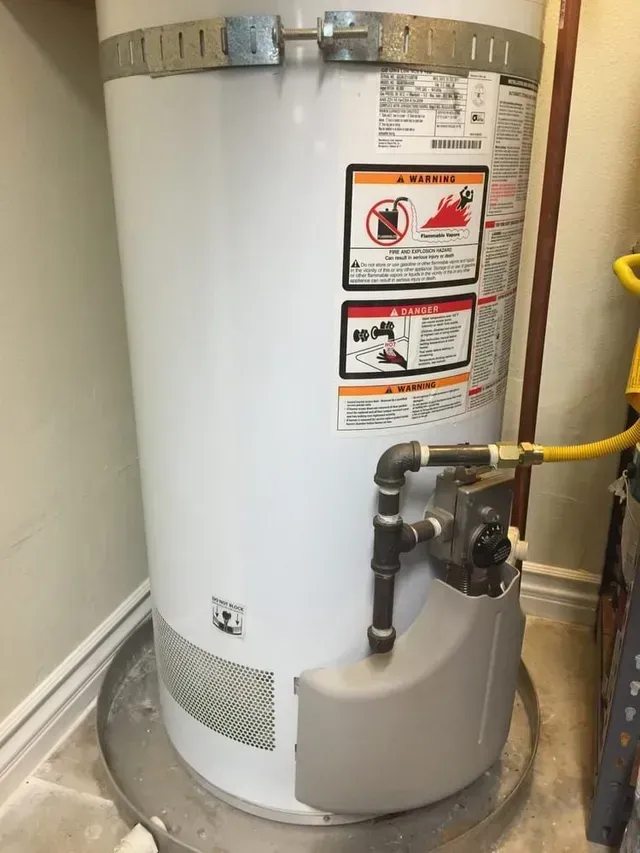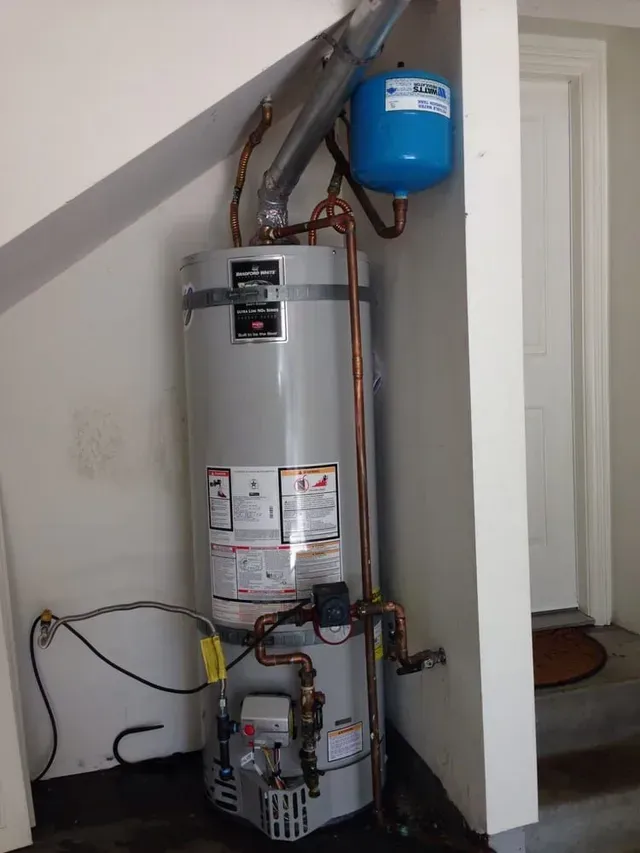Traditional Gas Water Heater Repair and Replacements
Prefer to Call? We are available at (310) 697-2877
A working water heater is important for your home. It gives you hot showers, helps wash dishes, and lets you do laundry. Your water heater keeps going without you seeing it. Out of all the choices, gas water heaters are a top pick. They are known for being reliable and cheap and can handle what most families need.
But what do you do when your water heater stops working or gets too old?
Which is Better: A Tankless or a Traditional Water Heater?
Choosing a water heater, whether tankless or traditional gas, really depends on what your home needs. Both types have their pros and cons:
Tankless Water Heaters
These systems heat water when you need it. They do not use a storage tank. Because of this, they are usually better at saving energy. They only heat water when you need it. The benefits include:
- Save money on energy bills in the long run
- The small size helps save space
- Lasts longer (20+ years)
However, tankless water heaters may struggle to provide enough hot water for big households. This is especially true when several taps are being used simultaneously. They also usually cost more to buy and install upfront.
Traditional Gas Water Heaters
Traditional gas water heaters keep hot water in a tank. This gives you a steady supply of hot water. They work well for homes that use a lot of water. Here are some benefits:
- Lower initial cost
- Easier setup
- Steady hot water supply
The downside is their higher energy use. This is because of standby heat loss. The tank keeps reheating water, even when no one is using it.
What Is a Conventional Gas Water Heater?
A traditional gas water heater is a common type of water heater in homes today. It uses natural gas or propane to heat water stored in a tank, so it is ready for use anytime. People prefer these heaters because they are simple and can give reliable hot water for showers, dishwashing, and other tasks at home.
Key Components of a Conventional Gas Water Heater
- Tank: The storage tank holds a certain amount of water, usually between 30 and 80 gallons.
- Gas Burner: This is at the bottom of the tank. It heats the water with natural gas or propane.
- Thermostat: A device that controls the water temperature, keeping it from being too hot or too cold.
- Anode Rod: This rod helps stop rust by pulling in elements that cause rust in the water.
- Pressure Relief Valve: This keeps the tank from getting too much pressure. It helps avoid damage or leaks.
How Long Does a Typical Gas Water Heater Last?
The typical lifespan of a regular gas water heater is 8 to 12 years. Some of them can last up to 15 years or more if they are well taken care of. Things that affect how long they last include:
- Water Quality: Hard water has many minerals in it. This can lead to buildup, which can make the heater last less time.
- Usage: Heaters that are used often or in bigger homes can wear out more quickly.
- Maintenance:
Taking care of the heater, like flushing the tank and changing the anode rod, can help it last much longer.
If your water heater is more than 10 years old and showing wear, it might be time to think about replacing it.
What Is a Traditional Tank Water Heater?
A traditional tank water heater works by keeping water in a tank and heating it until you need it. This system is popular in homes. It is especially good for families who use water regularly.
Advantages of Tank Water Heaters
- Trustworthy Hot Water Supply: Great for homes with high water needs.
- Lower First Cost: Cheaper than tankless models.
- Tested Systems:
These systems have been used for years and are well-known by experts.
Disadvantages of Tank Water Heaters
- Energy Waste: Standby heat loss can raise energy bills.
- Space Needs:
The tank can use much space in basements or service rooms.
Signs Your Traditional Gas Water Heater Needs Repair
Your water heater will not last forever. There are some clear signs to look for when it needs help:
- Rusty or Discolored Water: This means there is corrosion in the tank.
- Unusual Noises: A rumbling or popping sound can show that there is a buildup in the tank.
- Unsteady Water Temperature: This might mean that the thermostat or heating element part is not working well.
- Leaks:
Water collecting at the bottom of the tank usually means a crack or loose parts.
Ignoring these issues can lead to bigger problems. So, it’s best to deal with them quickly.
When to Replace a Traditional Gas Water Heater
Knowing when to change your water heater can help you avoid surprise failures. Here are some signs that show it’s time for a traditional gas water heater replacement:
Frequent Repairs
If repair costs go over half the cost of a new unit, getting a new one is the better choice.
Age
Units older than 10 years are more likely to break.
Energy Costs
Higher energy bills may mean your heater is not working well.
Replacing your water heater can make it use less energy. It can also offer better features, like smart controls.
Why Regular Water Heater Maintenance is Key
Regular upkeep is important for making your water heater last longer and for preventing expensive fixes. Things to do include:
- Inspecting the Anode Rod: Change it every 2 to 3 years to stop rust.
- Checking for Leaks: Finding leaks early can stop water damage.
- Flushing the Tank:
This gets rid of stuff that can lower how well it works.
DIY care can manage simple jobs, but it is best to have a professional check once a year. This helps to make sure everything works well.
Energy Efficiency and Traditional Gas Water Heaters
While traditional gas water heaters are less energy-efficient than modern alternatives, you can still improve their performance with these tips:
- Insulate the Tank: Reduce heat loss by wrapping the tank in an insulation blanket.
- Lower the Thermostat: Set the temperature to 120°F to save energy and prevent scalding.
- Flush the Tank:
Removing sediment buildup ensures optimal heating efficiency.
Why Choose Aquilina Plumbing and Rooter?
At Aquilina Plumbing and Rooter, we are proud to provide high-quality services for fixing and replacing gas water heaters. With more than 20 years of experience, our team can address any problem carefully and quickly.
Quick Response
We know that water heater problems need fast attention, and we work to fix them quickly.
Clear Pricing
There are no hidden costs—just fair rates.
Satisfaction Guarantee
We support our work, making sure you are happy every time.
Replacing your water heater can make it use less energy. It can also offer better features, like smart controls.
Contact Aquilina Plumbing and Rooter Today
A standard gas water heater works hard for your home. It gives you hot water when you need it. Taking care of it, fixing it on time, and picking the right people can help it last longer and work well.
Don’t let water heater problems ruin your day. Call Aquilina Plumbing and Rooter at
(310) 697-2877 or visit our website to set up your help today.
Aquilina
Plumbing and Rooter
Phone:
(310) 697-2877
Email:
aquilina.plumbing1@gmail.com
Business Hours:
- Mon - Fri
- -
- Sat - Sun
- Closed
24/7 Emergency Service Availability
Contact Us
Frequently Asked Questions
How often should I flush my traditional gas water heater?
It’s a good idea to flush your water heater at least once a year. This helps get rid of any dirt and debris that has gathered inside.
Can I upgrade my current hot water heater without replacing the system?
Yes, upgrading parts like the thermostat or adding insulation can help performance.
What are the common causes of a leaking gas water heater?
Leaks often happen because of rust, loose parts, or a broken pressure relief valve.
Is a traditional gas water heater less efficient than an electric water heater?
Yes, that is true, but regular care can help them work better.
How can I prolong the lifespan of my water heater?
Schedule regular upkeep, flush the tank, and check parts like the rod.



